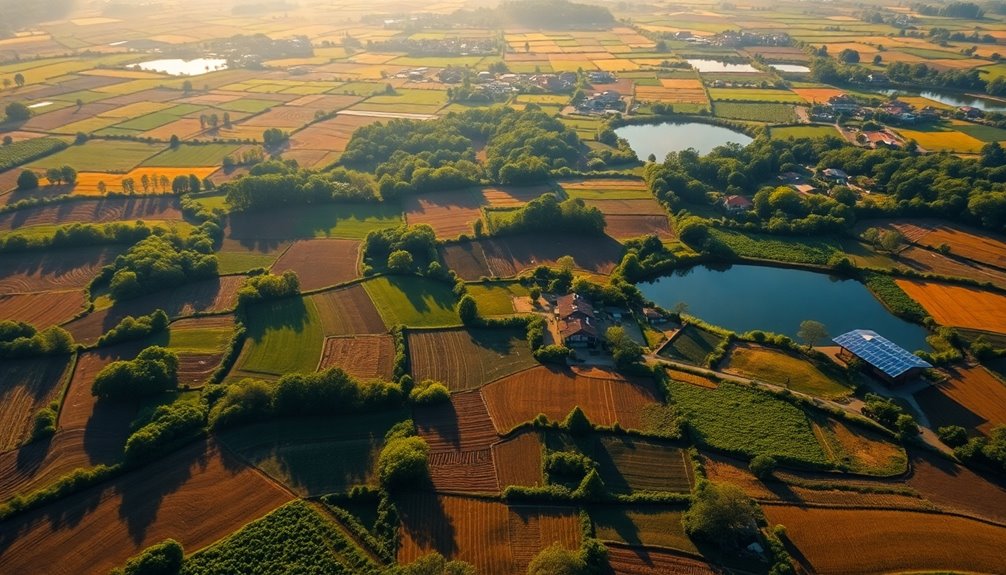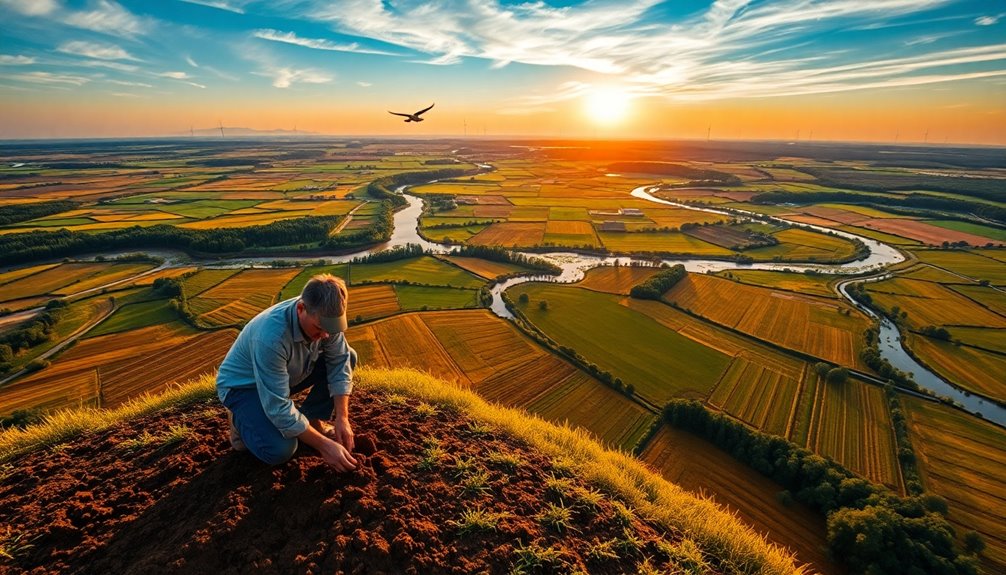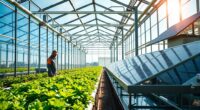Worldwide crop commodities have a significant eco-impact across various levels. They occupy half of the habitable land, contributing to biodiversity loss and habitat destruction. Agriculture consumes about 69% of fresh water, leading to pollution and water scarcity. Additionally, food production accounts for over a quarter of global greenhouse gas emissions. These agricultural practices can also influence local economies and communities. There's so much more to uncover about how these factors interconnect and affect our world.
Key Takeaways
- Agricultural expansion for crop commodities significantly contributes to deforestation, habitat destruction, and biodiversity loss across the globe.
- Crop production, particularly for soy and palm oil, leads to extensive land use changes, affecting ecosystems and wildlife populations.
- Agriculture is responsible for about 69% of the world's fresh water consumption, resulting in water scarcity and pollution from runoff.
- Greenhouse gas emissions from food production, especially livestock farming, significantly contribute to climate change and environmental degradation.
- Economic pressures drive unsustainable farming practices, highlighting the need for a balance between agricultural productivity and environmental sustainability.

As agriculture expands to meet the demands of a growing global population, its eco-impact becomes increasingly pronounced. You mightn't realize that half of the world's habitable land is now dedicated to agriculture, which significantly affects biodiversity. This expansion often leads to deforestation and habitat destruction, particularly with crops like soy and palm oil, causing irreversible loss of natural ecosystems.
Moreover, livestock farming consumes the majority of agricultural land, further complicating our planet's ecological balance. Pasture and cropland occupy around 50% of Earth's habitable land, highlighting the scale of the issue.
Livestock farming occupies most agricultural land, intensifying the challenges to our planet's ecological balance.
Water usage is another critical aspect of agriculture's eco-impact. The sector consumes around 69% of the planet's fresh water, creating significant pressure on freshwater systems. You likely know that agricultural runoff, laden with fertilizers and pesticides, leads to pollution in waterways, causing eutrophication. This can result in water stress in various regions, exacerbating environmental degradation.
Improper irrigation practices only add to the challenge by wasting precious water resources.
Greenhouse gas emissions also play a vital role. Did you know that food production accounts for over a quarter of global emissions? Livestock farming, especially cattle, is a major contributor to methane emissions, while land use changes for agriculture release stored carbon back into the atmosphere.
Supply chains further amplify these emissions through transportation and processing.
The biodiversity loss linked to agricultural activities is alarming. Habitat destruction puts numerous species at risk, diminishing global wildlife populations. Monoculture farming reduces genetic diversity within crops, making the ecosystem even more vulnerable.
However, if you support the reduction of agricultural land use and advocate for habitat restoration, wildlife can begin to rebound.
Lastly, the economic and social impacts of agricultural practices are significant. Many people living in poverty rely on farming, yet economic pressures often lead to unsustainable practices.
Frequently Asked Questions
How Do Crop Commodities Affect Local Biodiversity?
Crop commodities affect local biodiversity in several ways. When you expand agricultural land, you often destroy habitats, leading to a decline in species.
Monoculture farming reduces the variety of plants and animals, disrupting ecosystem dynamics.
Additionally, the reliance on chemical inputs can harm beneficial organisms, impacting pollination and pest control.
What Role Do Consumers Play in Eco-Impact Reduction?
You play a crucial role in reducing eco-impact through your consumer choices.
By shifting to plant-based diets, buying locally produced food, and supporting sustainable agricultural practices, you can significantly lower carbon emissions.
Reducing food waste and promoting organic options also make a difference.
Your demands influence agricultural policies and encourage businesses to adopt eco-friendly practices.
Educating yourself and others about sustainable food systems enhances public trust and fosters a culture of sustainability.
Are There Sustainable Alternatives to Traditional Crop Commodities?
Did you know that agriculture accounts for nearly 70% of global freshwater use?
There are definitely sustainable alternatives to traditional crop commodities. You can explore crop diversification, which enhances biodiversity and reduces environmental impact.
Eco-friendly farming practices like conservation tillage help preserve soil health. Additionally, consider crops such as lentils and mung beans that require less water.
How Does Climate Change Influence Crop Yields?
Climate change influences crop yields by altering temperature, water availability, and nutrient content.
You might notice that warmer climates can reduce yields, especially for sensitive crops like maize and rice.
Extreme weather events, like droughts and floods, can further stress crops, leading to significant production variability.
While some regions may adapt and see increased yields, others face serious declines, making it crucial for you to understand these changes and adapt your farming practices accordingly.
What Are the Economic Implications of Eco-Friendly Farming Practices?
Isn't it ironic that going green could actually fatten your wallet?
Eco-friendly farming practices not only cut operational costs by reducing chemical use, but they also allow you to charge market premiums for your products.
With government incentives and the potential for long-term profitability, you're setting up a sustainable future.
Plus, as you engage your community and create jobs, you're boosting the local economy while cultivating healthy crops.
Who knew saving the planet could be so profitable?
Conclusion
In today's world, the eco-impact of crop commodities isn't just a buzzword; it's a reality we all face. From the soil to your dinner plate, every choice matters. By being mindful of what you consume, you can help create a sustainable future. Remember, it's not just about the here and now; it's about the legacy you leave behind—like planting a seed in history that will grow into a greener tomorrow. So, let's make it count!









